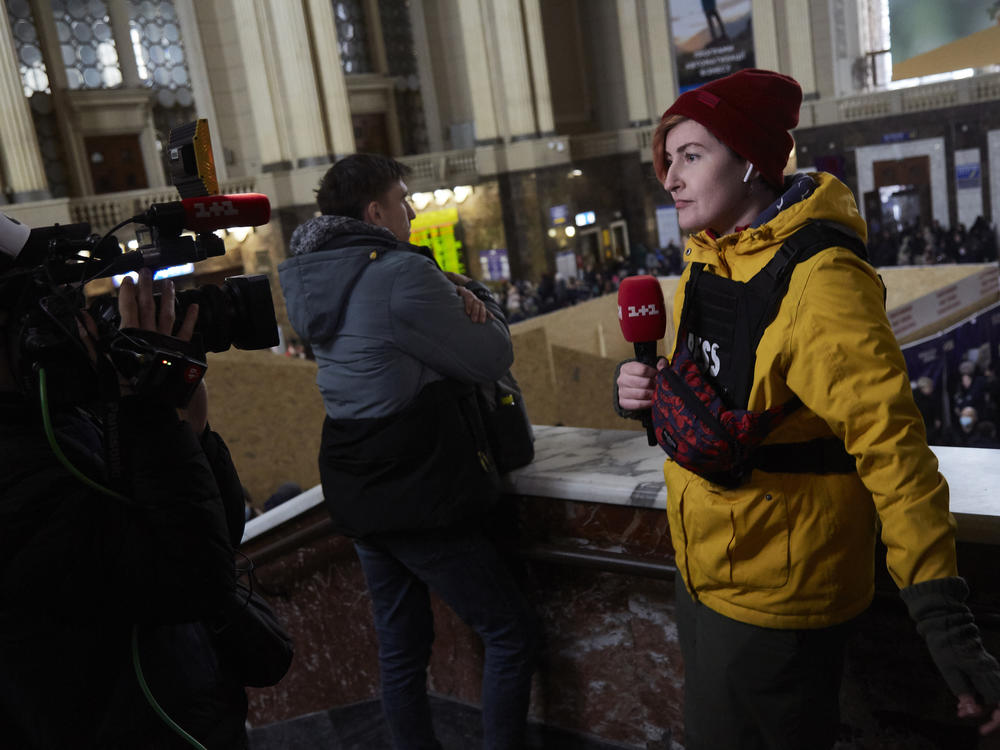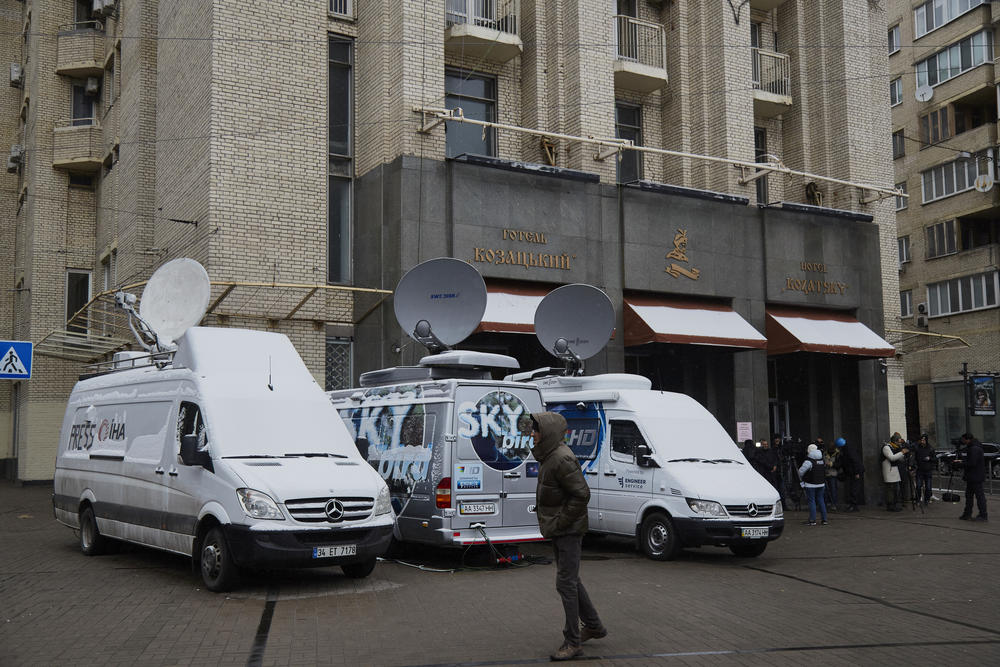Section Branding
Header Content
Not every war gets the same coverage as Russia's invasion — and that has consequences
Primary Content
It's a fact of modern life that some wars get more attention than others. And Russia's invasion of Ukraine has captured the public's attention in the West in a way that other recent wars — like those in Yemen or Ethiopia — simply haven't.
The reason is obvious, says Christopher Blattman, an economist at the University of Chicago and the author of Why We Fight: The Roots of War and the Paths to Peace. This is more than a regional conflict. It's a potential global conflagration. Superpowers are taking sides. There are fears that it could lead to nuclear escalation.
But what about other wars going on right now? In the Tigray region of Ethiopia, for example, a conflict that started in 2020 has led to thousands of casualties and displaced an estimated 2 million people. That crisis has largely been ignored by the world, says Magdalene Abraha, a writer in London of Tigrayan heritage. She has many family members in that region of Ethiopia.
Abraha does not object to the massive and ongoing media blitz in Ukraine. "My first reaction was: fantastic," she says. "Human suffering of that nature should be covered hugely and on a global scale."
"In the same breath," she adds, "it would be good to have this kind of attention to all crises relating to war, famine and natural disasters in the world."
Societies often care more about conflicts they relate to
Some observers point to other reasons for the Western world's interest in Ukraine. "Generally speaking, it seems reasonable for any society to care more about conflicts that are geographically closer, share a social identity (which could include race and religion), share a language or share an imperial or colonial history," Blattman wrote in an email to NPR.
Jackline Kemigisa, a journalist and podcaster based in Kampala, Uganda, says a recent BBC news clip of an interview with former Ukrainian official David Sakvarelidze makes that point in stark — and offensive — terms. He described those affected by the Ukraine war as "European people with blue eyes and blond hair being killed, children being killed every day." His statement was widely condemned by journalists and activists as racist.
Kemigisa, who posted a viral Twitter thread criticizing how Western media organizations have covered Ukraine, is one of the critics. She finds Sakvarelidze's sentiment highly problematic.
His comment, she says, "signals to the audience that this was the human being" worth protecting — not the lives of people of color lower in the "hierarchy" created by the world's "white supremacist, capitalistic system."
"If we are to give sympathy, let's give it to everyone who is a victim of war rather than selectively applying it based on location and race," says Kemigisa.
The media can drive a sweeping global response to a crisis — to a point
Media coverage doesn't merely create public awareness, says Martin Scott, a senior lecturer in media and international development at the University of East Anglia. It can have an impact on the world's response.
For example, when global attention is focused on a crisis, that can lead to greater mobilization of a government's allocations for humanitarian aid.
In December, Scott and a team of researchers surveyed senior government decision-makers in 16 of the world's largest donor countries to understand how news stories influence how much they give in an emergency. The authors of the report write that "intense news coverage" of a crisis, in certain circumstances, "created pressure" on those decision-makers that "led to an increase in emergency aid allocations."
"The Beirut blast is a good example of that," says Scott, referring to the explosion of ammonium nitrate at the Port of Beirut in 2020, which killed more than 200 people. "It was media coverage that drove more humanitarian aid allocations to the Beirut blast than otherwise would have been given, than perhaps even the humanitarian needs required."
News coverage can also dramatically impact donations
Right now, funds from the public are flowing into relief efforts for Ukraine. "Ukraine is generating a level of sustained, across-the-board media and public attention that other crises just haven't generated recently. And we know that does affect giving," says Lynn Hector, interim managing director of communications at the global humanitarian organization Mercy Corps.
Although Hector says it's too early to tell "how sizable and prolonged" giving to Ukraine will be, "we expect to surpass with Ukraine what we raised in its entirety for the Haiti 2021 earthquake" — $2.5 million so far. Mercy Corps' fundraising appeal for Ukraine began last weekend.
But an initial burst of giving doesn't last. Hector explains that the longer a crisis goes on, the less likely people are to pay attention — and therefore the less likely they are to give. "It's really difficult to generate sustained giving," she says, especially for "protracted crises like Afghanistan or Syria."
And while attention can help boost donations, sustained media coverage doesn't guarantee an end to a crisis — or the suffering that ensues. A 2021 study in the Journal of International Humanitarian Action looked at whether news stories of the Rohingya refugee crisis in The New York Times and The Guardian had an effect on efforts to address human suffering. Despite hundreds of articles published between 2010 and 2020, the authors found that the stories were "not sufficient to initiate humanitarian interventions" — like motivating decision-makers to enforce economic sanctions or engage in diplomatic efforts to reduce violence.
There are proposals to bring wider coverage to other conflicts
So the experts admit that the world is simply not going to pay equal attention to all crises. Is there a way to change that?
One recommendation from the international aid group CARE: Media outlets should find creative ways to keep underreported crises top of mind. That's what CARE proposed in its annual report of underreported humanitarian crises in January.
But that kind of recommendation is hard to bring to reality. "The decrease in budgets, the drop in advertising revenues and the reduced network of correspondents around the world have caused a void in the media coverage of crises," said Omar Bizo, manager of Appui au Développement Local (Support to Local Development), a nonprofit organization in Niger, writing in the CARE report.
Bizo, whose country is facing a wave of climate disasters, doesn't think it's a hopeless cause. He suggests committing a certain percentage of airtime to a crisis, broadcasting a special roundtable discussion on the topic or even giving money to local journalists in the area of conflict.
As for Abraha, she wishes journalists could report on the conflict in Ethiopia with the same enthusiasm and heart she has seen in their coverage of Ukraine — with vivid characters, from children whose cancer treatment was interrupted to an elderly Russian woman who was arrested for carrying a war protest sign.
If the same kind of attention were devoted to Ethiopia, she says, then perhaps the world would care more about the conflict and the real people who are affected — "people with thriving careers, passions, relationships, goals."
Like her cousin in Tigray, who's in his 20s. "He had dreams of being an engineer," she says. "He's an amazing son who loves his mother. He loves football and riding his bike."
With internet and phone communications cut off from Tigray, she has not heard from him since last summer.
Copyright 2022 NPR. To see more, visit https://www.npr.org.


